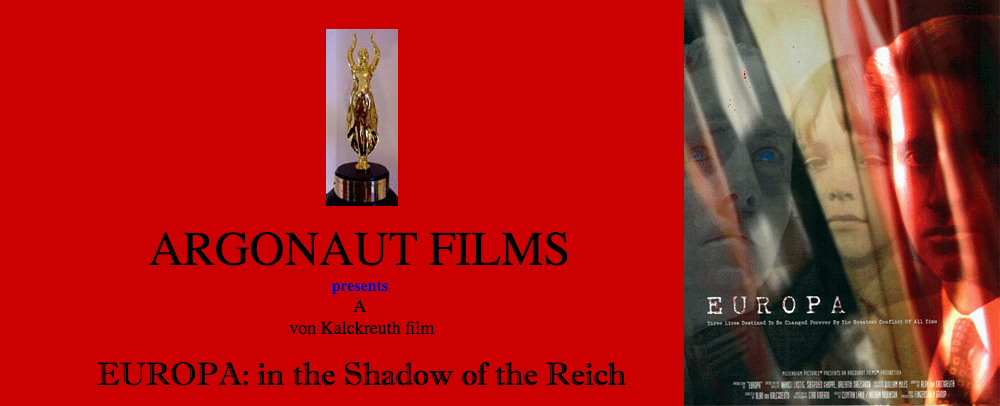
EUROPA: In The Shadow of the Reich is a feature documentary recounting the lives of three men who lived during the Second World War. Arnost Lusting was a teenager when he was sent to the Jewish ghetto, Theresinstadt and then to the death camp of Auschwitz; Siegfried Knappe was a German officer when war broke out and fought as a front line soldier on both the Western and Eastern fronts. He served as the Operations Officer during the Battle of Berlin; Valentine Berezhkov was a Soviet Diplomat in Berlin and the interpreter for Molotov in his meetings with Hitler and Ribbontrop. After Germany invaded the Soviet Union he interpreter for Stalin in his meetings with the Allied Power.
Through archive film, dramatic reconstructions and rare unpublished photographs von Kalckreuth shows us a side of history that we rarely see in history book – the personal impact of history on people consumed by its very unfolding.
Alan von Kalckreuth wrote and produced EUROPA in the Shadow of The Reich. The project was inspired by the films of Arnost Lustig. Excerpts from these films have been used in the documentary. “I was shocked by the story that unfolded as I watched Lustig’s films and read his books,” recalls von Kalckreuth.
British born von Kalckreuth went to collage in Washington D.C. where he studied film and screen writing under Professor Arnost Lustig. “In 1994 I was working on a screenplay about a German boy growing up in Nazi Germany and I meet Siegfried Knappe, a former German General Staff officer… Now I was seeing the same period of history from a 180 degree shift,” von Kalckreuth explains.
“So who was bending the truth, both men seemed to me to be honest men of integrity ?”
The answer was going to be hard to find, but von Kalckreuth’s Masters degree in Clinical Psychology and his stubborn determination lead him to the Holocaust Museum in Washington and to a very supportive and helpful research staff. After two years of research and snooping through records von Kalckreuth discovered to his amazement that both men were accurate in their recollections and descriptions of the events of those year.
Knappe had been an operations officer and front line soldier during the war years and his memory of those years was remarkable, but that wasn’t all! Von Kalckreuth discovered that Knappe had been a keen amateur photographer since the age of thirteen and had documented his life from 1933 to 1945 in a stunning collection of photographs.
“I had a coffee with Lustig at The American University,” explains von Kalckreuth. “What do you think of a documentary film that tells the story of your life and Knappe’s in parallel?” he asked Lustig.
Lustig agreed that it would be an exciting and important way to present a broad perspective on those ferocious years and von Kalckreuth went to work.
In 1995 Europe celebrated the 50th anniversary of the end of the war and von Kalckreuth and his crew traveled through out Europe filming.
“I though I’d have the thing ready by the fall,” laughs von Kalckreuth (holding back a tear or two). “It took me another three years to finish the project!”
Von Kalckreuth decided that the material he had amassed: archive film from Europe and America; Lustig’s films; Knappe’s negatives; contemporary footage, was to important and valuable to put together on a credit card budget so he set about sourcing additional funding and assembled a talented and committed post team. “This film was made because of the loyalty and determination of a group of really great people” remarks von Kalckreuth. “One other, unexpected, consequence of the delay was meeting Valentine Berezhkov.”
Berezhkov had been the First Secretary in the Soviet Embassy in Berlin during the years of the Molotov-Ribbentrop Pact, and was the interpreter for Stalin and Molotov in their meetings with Roosevelt and Churchill. “I had already decided that I wasn’t even going to begin to consider the Russian perspective,” says von Kalckreuth. “Learning the dynamics of the events that were behind the actions of Hitler and his government and the impact they had on the Jews was all I thought my brain could take!”
But shortly after meeting Berezhkov von Kalckreuth knew he was going to have to eat his hat and the project expanded to its current scope of viewing the war years through the eyes of these three men. “Making this film is the most important thing I have ever done,” contends von Kalckreuth. “It is a film that I believe needed to be made and I am grateful to have worked with such great actors and crew in its making.”
EUROPA: In the Shadow of the Reich was considered for an Academy Award in the 1999 Academy Awards.
